Michael J. Behe's Blog, page 454
July 18, 2019
New findings show that ancestral single-celled organisms were “amazingly complex”
In the beginning, we were once told, the ancestors of the first animals were simple blobs of identical cells.
But then someone said, “Let there be research.” Anyway…
But now, painstaking genomic analyses and comparisons between the most ancient animals alive today and their closest non-animal relatives are starting to overturn that theory.
The recent work paints a picture of ancestral single-celled organisms that were already amazingly complex. They possessed the plasticity and versatility to slip back and forth between several states — to differentiate as today’s stem cells do and then dedifferentiate back to a less specialized form. The research implies that mechanisms of cellular differentiation predated the gradual rise of multicellular animals.
Now, scientists are reporting the most compelling evidence yet for the new narrative
.Jordana Cepelewicz, “Scientists Debate the Origin of Cell Types in the First Animals” at Quanta
How did they just happen to get to be amazingly complex if there is no design in nature?
See also: Before you go: DNA uses “climbers’ ropes method” to keep tangles at bay It all just swished into place among unthinking cells billions of yours ago. Otherwise, we wouldn’t be here. Righrt? Now shuddup!
DNA as a master of resource recycling
The amazing energy efficiency of cells: A science writer compares the cell to human inventions and finds that it is indeed amazingly energy-efficient.
In addition to DNA, our cells have an instruction language written in sugar Of course it all just tumbled into existence and “natural selection” somehow organized everything. As if.
Cells find optimal solutions. Not just good ones.
Researchers build “public library” to help understand photosynthesis
Wait. “The part of the plant responsible for photosynthesis is like a complex machine made up of many parts, … ” And machines just happen all by themselves, right? There is no information load to account for; it just evolved by natural selection acting on random mutation the way your Android did!
In Nature: Cells have “secret conversations” We say this a lot: That’s a lot of information to have simply come into being by natural selection acting on random mutation (Darwinism). It’s getting not only ridiculous but obviously ridiculous.
Researchers: Helpful gut microbes send messages to their hosts If the strategy is clearly identified, they should look for non-helpful microbes that have found a way to copy it (horizontal gene transfer?)
Cells and proteins use sugars to talk to one another Cells are like Neanderthal man. They get smarter every time we run into them. And just think, it all just tumbled into existence by natural selection acting on random mutations (Darwinism) too…
Researchers: First animal cell was not simple; it could “transdifferentiate” From the paper: “… these analyses offer no support for the homology of sponge choanocytes and choanoflagellates, nor for the view that the first multicellular animals were simple balls of cells with limited capacity to differentiate.”
“Interspecies communication” strategy between gut bacteria and mammalian hosts’ genes described
Researchers: Cells Have A Repair Crew That Fixes Local Leaks
Researchers: How The Immune System “Thinks”
Follow UD News at Twitter!
Researcher: Mathematics Sheds Light On “Unfathomably Complex” Cellular Thinking
How do cells in the body know where they are supposed to be?
Researchers A Kill Cancer Code Is Embedded in Every Cell
Follow UD News at Twitter!
Copyright © 2019 Uncommon Descent . This Feed is for personal non-commercial use only. If you are not reading this material in your news aggregator, the site you are looking at is guilty of copyright infringement UNLESS EXPLICIT PERMISSION OTHERWISE HAS BEEN GIVEN. Please contact legal@uncommondescent.com so we can take legal action immediately.
Plugin by Taragana
July 17, 2019
Why can’t we make apes behave like people?
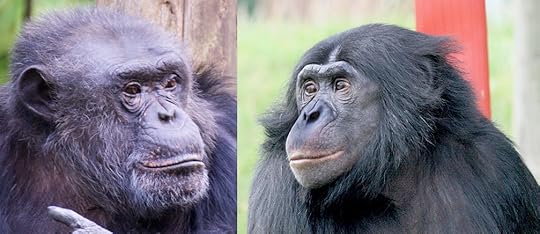 common chimpanzee and bonobo/Chandres William H. Calvin, CC
common chimpanzee and bonobo/Chandres William H. Calvin, CC If we are 99% chimpanzee, as claimed? Many researchers think that apes are just like us and that
we’re not doing the right things to make them start behaving that way…
According to comparative developmental psychologist Kim Bard, “Environment, not evolution, might underlie some human-ape differences,” charging that “underlying bias and poor experimental designs” account for the poor intellectual showing of apes as opposed to humans:
—
“These studies suffer from the same type of prejudice that once existed in studies of human intelligence, which started from a biased position of assuming northern Europeans were innately more intelligent than southern Europeans. We argue the same type of bias is apparent in cross-species studies.”
Professor Bard said: “Historically, many researchers have claimed humans are superior to apes in social intelligence, but the research is based on studies of captive adult apes isolated from European-style social interaction and human (usually children) from rich western cities. These experiment designs are simply not valid for the comparative study of species differences.
University of Portsmouth, “Environment, Not Evolution, Might Underlie Some Human-ape Differences” At Sciencedaily, 15 July 2019″
—
Apes are just like us but for some reason, they do not behave that way?
Actually, we have been here before and will doubtless be here again. In 2011, Erin Wayman told us at Smithsonian Magazine, “‘Talking’ apes are not just the stuff of science fiction; scientists have taught many apes to use some semblance of language.”
Have they? If so, why has it all subsided? What happened?
Denyse O’Leary, “Researchers: Apes are just like us!” at Mind Matters News
Further reading: Apes can be generous Are they just like humans then? (Michael Egnor)
Can animals reason? My challenge to Jeffrey Shallit (Michael Egnor)
Does social ability distinguish human intelligence from that of apes? Not altogether, of course, but it plays a bigger role than we sometimes assume. (Denyse O’Leary)
Follow UD News at Twitter!
Copyright © 2019 Uncommon Descent . This Feed is for personal non-commercial use only. If you are not reading this material in your news aggregator, the site you are looking at is guilty of copyright infringement UNLESS EXPLICIT PERMISSION OTHERWISE HAS BEEN GIVEN. Please contact legal@uncommondescent.com so we can take legal action immediately.
Plugin by Taragana
Now Steve Pinker is getting #MeToo’d, at Inside Higher Ed over Jeffrey Epstein
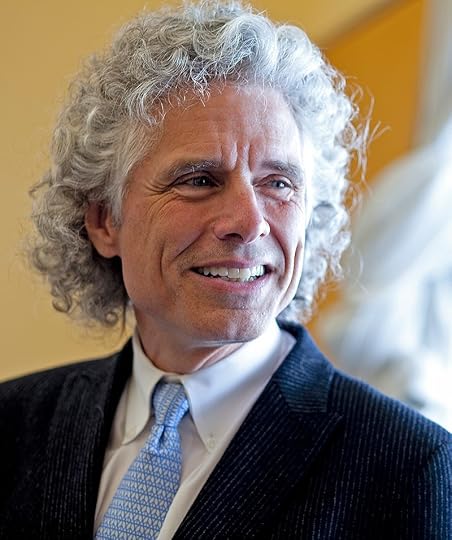 Steve Pinker/Rose Lincoln (CC BY 3.0 )
Steve Pinker/Rose Lincoln (CC BY 3.0 )In the Inside Higher Ed story, the rap against cognitive psychologist Pinker, who always seemed ready with a Darwinian explanation for everything, is that he offered some interpretation of language to Epstein’s lawyer, Alan Dershowitz.
Evolutionary biologist Jerry Coyne comments,
I used to think that Inside Higher Ed (IHE) was a pretty objective forum for reporting news from academia. But now, it seems, they’re going the way of BuzzFeed, publishing what is essentially a hit piece on Steve Pinker that, starting with his trivial assistance to Alan Dershowitz in the first prosecution of Jeffrey Epstein for sex crimes (Pinker interpreted the language of a statute, for chrissake), goes on to dredge up all the other accusations of Pinker from the last several years: he’s white, male, old, a sexist, and his scholarship is deficient. In other words, it goes beyond the ambit of the news to once again thrust a sword into Pinker…
Yes, the ending criticizes free speech as well as trotting out the “old white male” canard to denigrate free speech. Never mind that the head of the ACLU, and author of a very good new book on free speech, is a woman: Nadine Strossen. Never mind that one of the most stirring and eloquent defenses of free speech I’ve heard in recent years was given by Van Jones, a liberal (and black) commentator for CNN (watch it here). Never mind that minorities gained their rights largely through free speech—demonstrations and orations!
Jerry Coyne, “Now Inside Higher Education has a hit piece on Pinker” at Why Evolution Is True
As Coyne points out, free speech takes a beating in the piece too:
Christensen said it’s important to contextualize Pinker in the ever-growing “economy of intellect” — think TED Talks and thought influencers.
Comparing Pinker to University of Toronto psychologist and quasi-guru Jordan Peterson, Christensen said Pinker “courts public attention and controversy after years of creating and publicizing work that is interdisciplinary and outward focused.” Over the past few years especially, he said, Pinker has joined “a cadre of older, mostly white male academics who espouse a purist view of free speech and debate” that “ignores significant scholarship from women and scholars of color about how free speech and academic freedom as traditionally construed overweight and privilege already privileged voices” — meaning mostly white, older men.
Colleen Flaherty, “Pinker, Epstein, Soldier, Spy” at Chronicle of Higher Education
So the target audience believes neither in the defendant’s right to counsel nor in free speech. Glad we’ve got that clear.
Pinker may just be a blip on the radar screen of ambitious SJWs, for whom his celebrity made him a target. One wonders, who’s next?
This Twitter feed gives some sense of the SJWs at work.
See also: Jeff Epstein’s cultural dumpster fire spreads to ID vs. evo controversies Just because people are in the news doesn’t mean they did anything. It rather shows how a bad actor can change the news picture.
Is violence really declining, as cognitive psychologist Steven Pinker claims?
and
John Gray doesn’t think much of evolutionary psychologist Steve Pinker’s “better angels”
Follow UD News at Twitter!
Copyright © 2019 Uncommon Descent . This Feed is for personal non-commercial use only. If you are not reading this material in your news aggregator, the site you are looking at is guilty of copyright infringement UNLESS EXPLICIT PERMISSION OTHERWISE HAS BEEN GIVEN. Please contact legal@uncommondescent.com so we can take legal action immediately.
Plugin by Taragana
Ethan Siegel: Don’t trust experiments that claim there are parallel universes
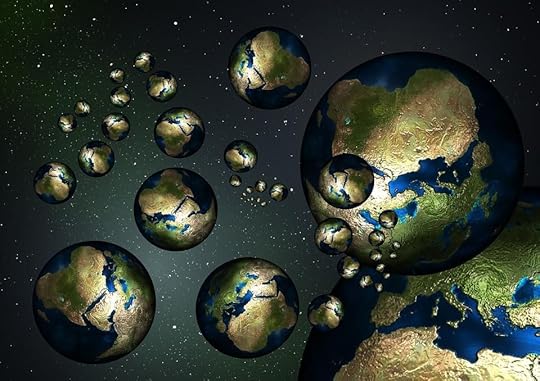 parallel worlds/Public Domain
parallel worlds/Public DomainThis sounds so sensible, we thought theoretical physicist Sabine Hossenfelder would say it. But astrophysicist Ethan Siegel said it:
Any time you get a positive signal from an experiment, you cannot simply take that signal at face value. Signals can only be understood in relation to the noise background of the experiment, which is a combination of every other physical process that contributes to the result. Unless you quantify that background and understand the source of everything that your final signal is composed of, you cannot hope to conclude you’ve discovered a new phenomenon in nature.
Science progresses one experiment at a time, and it’s always the full suite of evidence that must be considered in evaluating our theories at any given time. But there is no greater false flag than an experiment pointing to a new signal extracted against a poorly understood background. In the endeavor of pushing our scientific frontiers, this is the one area that demands the highest level of skeptical scrutiny. Mirror matter and even a mirror Universe might be real, but if you want to make that extraordinary claim, you’d better make sure your evidence is equally extraordinary.
Ethan Siegel, “You Must Not Trust Experiments That Claim The Existence Of Parallel Universes” at Forbes
This is a sober position for someone who flirts with the multiverse.
See also: Physicists: A mirror universe might explain dark matter
New Scientist has seen signs of a mirror universe touching our own Broussard is about to do tests to find out if it is true. That’s fun, of course, but in reality, no one can prove it false and it will therefore always be real when cosmologists need it. It would be still more fun to see Sabine Hossenfelder tackle this one.
Did Stephen Hawking Discover A Means Of Detecting Parallel Universes Just Before He Died?
That sounds a lot like grief talking but we’ll see.
Claim: Evidence, maybe, for parallel universes
Cosmologist: Parallel Universes Are Pushing Physics Too Far?
Alternate parallel universe found. Maybe (2015)
Test parallel universes for real?
Parallel universes TESTED?
Brit mid-market tabloid says Large Hadron Collider within days of discovering parallel universe
Scientific American tells us we may live in the past of a parallel universe
and why this is supposed to be science.
Follow UD News at Twitter!
Copyright © 2019 Uncommon Descent . This Feed is for personal non-commercial use only. If you are not reading this material in your news aggregator, the site you are looking at is guilty of copyright infringement UNLESS EXPLICIT PERMISSION OTHERWISE HAS BEEN GIVEN. Please contact legal@uncommondescent.com so we can take legal action immediately.
Plugin by Taragana
July 16, 2019
New measurement keeps the discrepancy around the Hubble constant alive
Cosmologists have puzzled over discrepancies in the measurement of the Hubble constant (67.4 km/sec/Mpc vs. 74.0 km/sec/Mpc), with some claiming that there is something fundamentally wrong with our picture of the universe. From a report on a new study at ScienceDaily:
“The Hubble constant is the cosmological parameter that sets the absolute scale, size and age of the universe; it is one of the most direct ways we have of quantifying how the universe evolves,” said Freedman. “The discrepancy that we saw before has not gone away, but this new evidence suggests that the jury is still out on whether there is an immediate and compelling reason to believe that there is something fundamentally flawed in our current model of the universe.”
In a new paper accepted for publication in The Astrophysical Journal, Freedman and her team announced a new measurement of the Hubble constant using a kind of star known as a red giant. Their new observations, made using Hubble, indicate that the expansion rate for the nearby universe is just under 70 kilometers per second per megaparsec (km/sec/Mpc). One parsec is equivalent to 3.26 light-years distance.
This measurement is slightly smaller than the value of 74 km/sec/Mpc recently reported by the Hubble SH0ES (Supernovae H0 for the Equation of State) team using Cepheid variables, which are stars that pulse at regular intervals that correspond to their peak brightness. This team, led by Adam Riess of the Johns Hopkins University and Space Telescope Science Institute, Baltimore, Maryland, recently reported refining their observations to the highest precision to date for their Cepheid distance measurement technique. Paper. (open access) – Wendy L. Freedman, Barry F. Madore, Dylan Hatt, Taylor J. Hoyt, In-Sung Jang, Rachael L. Beaton, Christopher R. Burns, Myung Gyoon Lee, Andrew J. Monson, Jillian R. Neeley, Mark M. Phillips, Jeffrey A. Rich, Mark Seibert. The Carnegie-Chicago Hubble Program. VIII. An Independent Determination of the Hubble Constant Based on the Tip of the Red Giant Branch. The Astrophysical Journal (accepted), 2019 More.
The new study got a Hubble constant of 69.8 km/sec/Mpc: “But the results do not appear to strongly favor one answer over the other say the researchers, although they align more closely with the Planck results.” So if there is something fundamentally wrong with our picture of the universe, there still is, more or less, and we will have to live with it for now.
See also: We actually don’t know the precise value of the Hubble constant.
New Findings: Discrepant Values In Universe’s Expansion Make Everything Murkier
and
Is Cosmology “In Crisis” Over How To Measure The Universe?
Copyright © 2019 Uncommon Descent . This Feed is for personal non-commercial use only. If you are not reading this material in your news aggregator, the site you are looking at is guilty of copyright infringement UNLESS EXPLICIT PERMISSION OTHERWISE HAS BEEN GIVEN. Please contact legal@uncommondescent.com so we can take legal action immediately.
Plugin by Taragana
Paleoanthropologist: Climate change will cause us to grow webbed feet
 A mermaid/John William Waterhouse, Public Domain
A mermaid/John William Waterhouse, Public DomainSo says a University of Kent paleoanthropologist:
Rising sea levels could force communities to live in underwater or semi-aquatic towns which could change out physiology.
Dr Matthew Skinner, a paleoanthropologist from the University of Kent, claims that humans could evolve to have webbed hands and feet and less body hair so they could move quickly through the water…
Our eyes would even become more like cats, so we could see in the murky gloom of seas and rivers and our lungs would shrink as we became used to using artificial tanks to breathe underwater.
“Regular underwater foraging would lead to the evolution of longer fingers and toes which would then likely develop ‘webbed’ interconnecting skin to enable easier swimming,” said Dr Skinner.
Sarah Knapton, “Humans could evolve webbed feet if sea levels rise, scientist claims” at Telegraph
Overheard in UD News’s smoky back room: “Okay, I see your “scientist who says AI is going to save Gaia” and I’m raising you one who says, “the way things are going, we’re all gonna have webbed feet.” And… hey, who ate all the chocolate pretzels again?!”
Triumphing over both of these, of course, would be the player who came up with an earnest, just-published study offering convoluted neuroscience theories as to why so many people don’t trust science.
Hat tip: Philip Cunningham
See also: AI will save Gaia, says James Lovelock at nearly 100 years of age. The Gaia hypothesis started out as science, then discovered weed. But a digital Gaia movement for the 21st century will not, one suspects, be hippies. Maybe not as nice.
Follow UD News at Twitter!
Copyright © 2019 Uncommon Descent . This Feed is for personal non-commercial use only. If you are not reading this material in your news aggregator, the site you are looking at is guilty of copyright infringement UNLESS EXPLICIT PERMISSION OTHERWISE HAS BEEN GIVEN. Please contact legal@uncommondescent.com so we can take legal action immediately.
Plugin by Taragana
Why are scientists “terrified” to do SETI research?
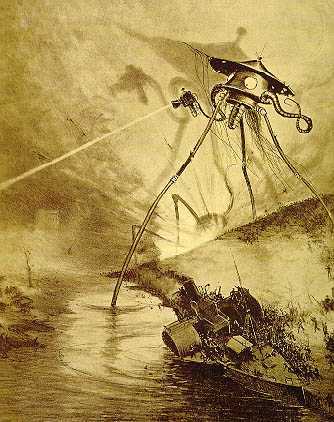 Alien tripod by Alvim Corréa, 1906 French edition of H.G. Wells’ “War of the Worlds”
Alien tripod by Alvim Corréa, 1906 French edition of H.G. Wells’ “War of the Worlds”We are told that there is “anti-SETI” stigma:
That’s according to scientists who spoke to Undark about how SETI research is dismissed and associated with conspiracy theories, especially after recent high-profile stories about the interstellar space rock ‘Oumuamua, thought by some to be a spacecraft, or the newly-rewritten military guidelines for UFO sightings.
Dan Robitzski, “Scientists Are Terrified of Seti Research” at Futurism
The Undark article is nothing if not imaginative:
Theoretical physics may have determined alien life is likely, but that’s still just a theory.
We may be finding nothing because we’re doing it wrong, researchers posit. In a 2018 conference paper, Colombano suggests the search for alien intelligence is based on “cherished assumptions” that could be holding it back: that interstellar travel is unlikely, that alien civilizations use radio waves, that other life must be carbon based, and that UFOs have never visited earth. He makes a case for discarding these dusty beliefs and for sociologists to imagine how alien societies might evolve, physicists to do more speculative work on space-time, and energy and technologists to model ways in which technology might evolve in other civilizations.
Diane Peters, “The Pitfalls of Searching for Alien Life” at Undark
We need more “speculative work”? No, we don’t. It seems as though the enthusiasts don’t understand that people can just lose confidence in a failing program and there is nothing wrong with them on that account.
See also: Tales of Oumuamua: Why are we still talking about the space cigarillo, oops, the Oumuamua alien sighting panic?
What? Oumuamua Was Just A Comet? After All The ET Hype?
Astronomer: We’re too dumb to think space object Oumuamua was an extraterrestrial lightsail.Hmmm. In the real world, when you are an only child so far as you know, it is hard to compare yourself to your siblings. Few readily accept criticism for failure to measure up to the standards of imaginary beings.
Conventional Non-ET Explanations For Oumuamua
Astronomers: Solar System Object In Transit, Oumuamua, Might Be A “Light Sail Of Extra-Terrestrial Origin”
Why Some Scientists Saw Asteroid Oumuamua As ET
Why can top scientists get away with extraordinary claims?
Did Interstellar Object Oumuamua Normalize Space Aliens As Science In 2018?
and
Astronomers: Solar system object in transit, Oumuamua, might be a “light sail of extra-terrestrial origin”
Follow UD News at Twitter!
Copyright © 2019 Uncommon Descent . This Feed is for personal non-commercial use only. If you are not reading this material in your news aggregator, the site you are looking at is guilty of copyright infringement UNLESS EXPLICIT PERMISSION OTHERWISE HAS BEEN GIVEN. Please contact legal@uncommondescent.com so we can take legal action immediately.
Plugin by Taragana
AI will save Gaia, says James Lovelock at nearly 100 years of age
We hadn’t heard this one before: AI will care more about climate change than we do:
Some colleagues have grumbled openly that it isn’t science. Lovelock does not worry. He awaits the Singularity. Our AI overlords, he thinks, will rescue Gaia because, unlike us, they will realize the truth:
Novacene picks up from that note of hope, and showcases another big idea. Gaia might, after all, be saved — by the singularity. This artificial-intelligence takeover, which so alarms many doomsayers, will be our redemption. Lovelock argues that increasingly self-engineering cyborgs with massive intellectual prowess and a telepathically shared consciousness will recognize that they, like organisms, are prey to climate change. They will understand that the planetary thermostat, the control system, is Gaia herself; and, in tandem with her, they will save the sum of remaining living tissue and themselves. The planet will enter the Novacene epoch: Lovelock’s coinage for the successor to the informally named Anthropocene. – Tim Radford, “James Lovelock At 100: the Gaia Saga Continues” At Nature”
We are, Lovelock tells Radford, but “parents and midwives” to the savior cyborgs.…
Is he perhaps looking for something beyond science to save us all? If so, AlphaGo and its successors are likely to disappoint, says computer engineer
Eric Holloway “Our AI overlords will save Earth, says prominent scientist” at Mind Matters News
The Gaia hypothesis started out as science, then discovered weed. But a digital Gaia movement for the 21st century will not, one suspects, be hippies. Maybe not as nice.
See also: Taking the Gaia hypothesis seriously at Nautilus
and
Can the new AI poker champ improve real-world decisions? That’s the claim aired at Nature for Pluribus, the new Texas hold ‘em champ. Bradley Center fellows are skeptical. “The trouble is,” says Brendan Dixon, “any technique that works by searching ‘to the end of the game’ will not help self-driving cars (as an example) one bit…unless they have also mastered predicting the future. There is no ‘end of the game’ for nearly all decisions we make.”
Follow UD News at Twitter!
Copyright © 2019 Uncommon Descent . This Feed is for personal non-commercial use only. If you are not reading this material in your news aggregator, the site you are looking at is guilty of copyright infringement UNLESS EXPLICIT PERMISSION OTHERWISE HAS BEEN GIVEN. Please contact legal@uncommondescent.com so we can take legal action immediately.
Plugin by Taragana
July 15, 2019
Behe vindicated by goldfish? But of course!

In Darwin Devolves, Michael Behe argues that polar bears succeed because “genes for regulating fat and for metabolizing cholesterol became broken or blunted, and this had a side effect of keeping the bears warm in cold climates, changing their coat color, while permitting them to survive on fatty diets of seals. Darwin’s mechanism did not create anything new; it broke things, but in the case of the polar bear, it worked out.”
Researchers hoping to see Darwinian selection leading to improvement in goldfish after they diverged from zebrafish and carp failed to see much.
What the researchers did find in abundance, however, is information loss. Once genomes of zebrafish and goldfish were available, loss was evident…
While evidence for evolutionary gain was largely absent in their paper, the word loss appears 74 times, and lost 27 more times! Which process appears to have predominated? So how are goldfish like polar bears? They evolved primarily by loss. Genes became lost or inactive, or expression levels changed. Nothing new evolved to make a polar bear or a goldfish into some wonderful, innovative new creature. Goldfish are, essentially, broken carp that get along with different expressions of the same genetic information.
“Behe Vindicated Again: Goldfish Are Broken Carp” at Evolution News and Science Today:
The principle behind Darwin Devolves is not only right but obviously right. The most likely way for natural selection to change a life form would be to blunt or break something because natural selection is an unintelligent cause.
We see this all the time. Animals gnaw a hole in the bottom of a jug of water and they get some water but the rest is wasted. They destroy the feedhouse door trying to get into the feed because they don’t know how to use the doorhandle. They do get fed but the feed is scattered and much is wasted. That’s what an unintelligent cause is typically like. Put another way, the animals won’t learn to use the doorhandle or the jug cap. But just to survive and reproduce, they might not need to.
Note: A handful of animals (octopuses, monkeys, and apes, for example) can open jar lids. But it isn’t something we should usually expect. In the same way, we should not usually expect a cause like natural selection to craft elegant structures of great complexity. No matter what we think about origins, we should scrutinize such claims very carefully.
See also: Eric Metaxas interviews Michael Behe
Michael Behe responds to the critics at his university, Parts 2 and 3
Follow UD News at Twitter!
Copyright © 2019 Uncommon Descent . This Feed is for personal non-commercial use only. If you are not reading this material in your news aggregator, the site you are looking at is guilty of copyright infringement UNLESS EXPLICIT PERMISSION OTHERWISE HAS BEEN GIVEN. Please contact legal@uncommondescent.com so we can take legal action immediately.
Plugin by Taragana
Epigenetics silences cancer-linked genes from 400 million years ago
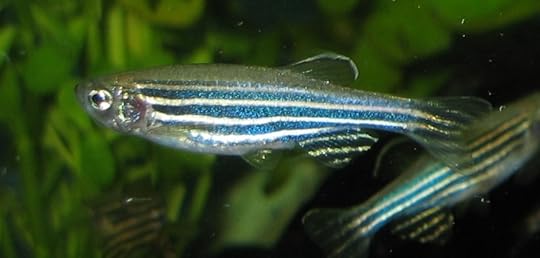 zebrafish/Azul
zebrafish/AzulFrom ScienceDaily:
Researchers uncovered that genes turned on in some cancers in humans also exist in zebrafish — but are ‘silenced’ within just hours of fertilisation. The study sheds new light on how our epigenetics can regulate genes, some of which are linked to cancer development later in life, over large evolutionary distances. It also uncovers significant differences between how the epigenome ‘resets itself’ in zebrafish and human embryos, which may guide future studies on epigenetic inheritance. …
Humans and zebrafish are estimated to have shared a common ancestor 400 million years ago. How do the zebrafish do things?
The team uncovered fundamental differences in how DNA is methylated in mammalian and zebrafish embryos.
In humans, these DNA methylation tags are mostly ‘swept clean’ when a sperm fertilises an egg, and then gradually methylated again, to ensure the embryo can develop correctly. Instead, zebrafish embryos retain the methyl group pattern of the father.
In this study, the researchers found that primordial germ cells of zebrafish do not reset their methylation patterns either, but inherit paternal DNA methylation patterns. This contrasts with findings in mammalian primordial germ cells, which undergo a second ‘sweep cleaning’ of their DNA methylation tags. The researchers say this finding sheds light on the molecular principles of germline development and highlights zebrafish as a useful experimental model to study how epigenetic signatures are inherited throughout generations.
Further, the researchers screened how DNA is methylated in zebrafish embryos, at four stages of development. They discovered 68 genes that were methylated and turned off early during embryonic development, within 24 hours of fertilisation.
“What was interesting is that most of these genes belong to a group called cancer testis antigens,” says Dr Ksenia Skvortsova, co-first author of the study. “Our work shows that these are some of the very first genes that are ‘silenced’, or targeted by DNA methylation, in both zebrafish and mammals.”
The genes that code for cancer testis antigens, or CTAs for short, are only active in the male testis, but are turned off in all other tissues, in humans. For an unknown reason, CTA genes are turned on again in some cancers, such as melanomas.
“Mammals and fish have very different strategies when it comes to developing an embryo,” says Dr Bogdanovic. “But in spite of these very different strategies, it appears that the control of CTA genes are conserved throughout evolution.”
Paper. (open access) – Ksenia Skvortsova, Katsiaryna Tarbashevich, Martin Stehling, Ryan Lister, Manuel Irimia, Erez Raz, Ozren Bogdanovic. Retention of paternal DNA methylome in the developing zebrafish germline. Nature Communications, 2019; 10 (1) DOI: 10.1038/s41467-019-10895-6 More.
The main thing we’re learning these days is that epigenetics is much more important than we used to think. Which means that purely Darwinian evolution must be much less so.
See also: What if there is no genetics apart from epigenetics
Epigenetic learning confirmed in nematodes; Weismann barrier broken
and
Epigenetic change: Lamarck, wake up, you’re wanted in the conference room!
Copyright © 2019 Uncommon Descent . This Feed is for personal non-commercial use only. If you are not reading this material in your news aggregator, the site you are looking at is guilty of copyright infringement UNLESS EXPLICIT PERMISSION OTHERWISE HAS BEEN GIVEN. Please contact legal@uncommondescent.com so we can take legal action immediately.
Plugin by Taragana
Michael J. Behe's Blog
- Michael J. Behe's profile
- 219 followers



